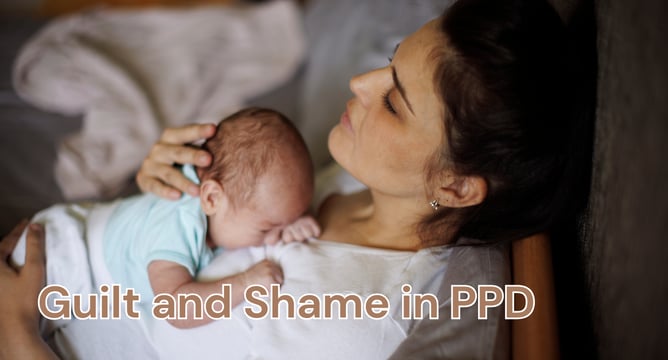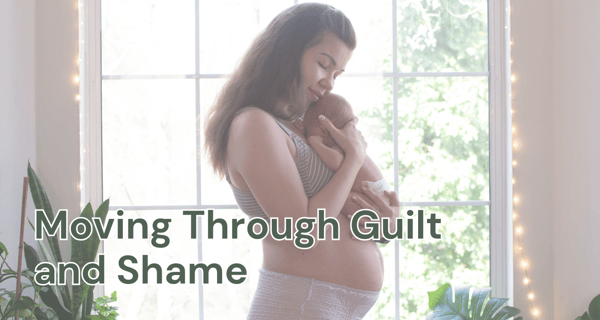Coping With Guilt and Shame During Postpartum Depression
7/1/20254 min read
Motherhood is often romanticized as a time of radiant joy, instant bonding, and unconditional love. But for many new mothers, the reality is far more complicated. Instead of joy, some feel sadness. Instead of bonding, they feel detachment. And amid the exhaustion and confusion, two particularly heavy emotions tend to rise to the surface: guilt and shame.
For those experiencing postpartum depression (PPD), guilt and shame can be both symptoms and side effects. They are not just emotional burdens—they’re barriers to recovery. And unlike a fever or a rash, they’re often invisible to others. Unacknowledged. Undiscussed. Unfairly internalized.
At Peace Temple, we hear this from clients time and time again: “I feel like I’m failing at being a mother,” or “Other moms are handling this—why can’t I?” These thoughts are not uncommon, but they are deeply harmful if left unchecked. This article explores the origins of guilt and shame in postpartum depression and, more importantly, offers compassionate strategies for coping and healing.


Why Guilt and Shame Are So Common in PPD
While guilt and shame are often used interchangeably, they carry different meanings—and both can be intensified in the postpartum period.
Guilt says, “I did something wrong.”
Shame says, “There’s something wrong with me.”
In postpartum depression, guilt often stems from feeling like you’re not doing enough or not enjoying motherhood the way you "should." Shame runs deeper—it suggests you’re unworthy or broken for feeling this way in the first place.
Where Do These Feelings Come From?
Cultural Expectations of Motherhood
Society pushes a narrative of the “perfect mother”—always selfless, always nurturing, always fulfilled. When a new mother experiences sadness, anger, or numbness instead, it clashes with this ideal. That disconnect breeds shame.Comparisons With Other Parents
Social media highlights the glowing side of parenting. Seeing curated images of joyful, well-dressed moms and giggling babies can fuel internal dialogue like, “Why can’t I feel like that? What’s wrong with me?”Bonding Challenges
Some mothers don’t bond instantly with their babies. While this is normal, it's rarely acknowledged. The result? Deep guilt and isolation.Thoughts of Harm or Disconnection
PPD can bring intrusive thoughts—images or fears that disturb and confuse. Even if they’re never acted upon, these thoughts can trigger intense shame. Many mothers are too afraid to speak up, fearing judgment or worse.
At Peace Temple, we work to dismantle these harmful inner narratives and create space for mothers to share their truths—without fear, and without shame.
How Guilt and Shame Interfere With Healing
Guilt and shame are not just emotional weights—they are barriers to care. Many mothers delay or avoid seeking help altogether because they believe they should be able to push through it on their own.
This internalized stigma leads to:
Isolation
Reluctance to ask for help
Fear of being labelled an “unfit parent”
Increased risk of severe depression or anxiety
These feelings can create a vicious cycle: depression leads to guilt, guilt fuels deeper depression, and round it goes.
That’s why breaking the silence around PPD is so crucial. The sooner these feelings are named and validated, the sooner healing can begin.


Coping Strategies: Moving Through Guilt and Shame
Healing doesn’t mean pretending these feelings don’t exist—it means learning how to respond to them differently. Here are strategies that can help:
1. Name the Emotion Without Judgment
Sometimes, just identifying what you’re feeling can deflate its power. Instead of thinking, “I’m a terrible mom,” try, “I’m feeling ashamed right now because I’m struggling.” This separates you from the emotion. It’s not who you are—it’s what you’re feeling.
2. Challenge Unrealistic Expectations
Ask yourself:
Where did I learn what a “good mother” is?
Who benefits from that narrative?
Is it realistic or compassionate?
Often, we hold ourselves to impossible standards shaped by media, upbringing, or cultural pressure. At Peace Temple, we help clients rewrite these mental scripts into ones that honour reality over perfection.
3. Talk About It—Even When It’s Hard
Shame thrives in silence. Talking to a therapist, a support group, or a trusted friend can offer immense relief. You may be surprised how many others have felt the same way.
Peace Temple’s postpartum support groups offer safe, stigma-free spaces to connect with others navigating similar emotional terrain.
4. Use “Mother Compassion” as a Model
Imagine how you’d speak to a friend—or your child—who felt like a failure. You’d never call them weak or broken. You’d offer kindness, reassurance, and empathy. You deserve the same.
Try writing a letter to yourself from this compassionate voice. It may feel awkward at first, but it’s a powerful tool for softening self-criticism.
5. Focus on Small, Sustainable Acts of Care
When depression clouds your mind, even basic tasks can feel insurmountable. Instead of aiming for “normal,” aim for kind:
Eat one nutritious meal.
Rest when the baby sleeps (even if it’s just closing your eyes).
Take a shower, even if you don’t feel like it.
These are not small wins—they’re survival victories. And they count.
6. Practice Emotional Reframing
Instead of thinking:
“I’m failing because I don’t feel connected to my baby,”
Try:“I’m showing up despite feeling disconnected—that’s strength.”
Reframing helps shift the narrative from blame to resilience. It reminds you that your effort—no matter how imperfect—is evidence of love.
When to Seek Professional Support
Guilt and shame should never be brushed aside, but when they begin to interfere with daily functioning, relationships, or self-worth, it’s time to reach out.
Signs it’s time to talk to a professional:
Persistent sadness or emotional numbness
Thoughts of self-harm or wishing to disappear
Inability to bond or care for your baby
Severe anxiety, panic, or obsessive thoughts
Withdrawing from loved ones or daily life
Peace Temple’s clinical team specializes in postpartum mental health. We offer individual therapy, trauma-informed care, and family-inclusive support to help mothers heal—not just emotionally, but holistically.
Final Thoughts: You Are Not Your Shame
Postpartum depression does not define you. Neither does guilt. Neither does shame.
You are not broken. You are not alone. And you are not the only one who has felt this way—even if it seems like everyone else is “handling it better.”
At Peace Temple, we hold space for the messy, complicated, and courageous reality of motherhood. We believe healing begins not when the pain ends, but when the shame around it does.
Because the truth is, you are not failing—you are fighting. And that matters more than you know.
